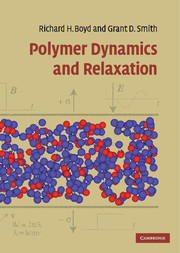Part I - Methodology
Published online by Cambridge University Press: 10 November 2009
Summary
The first five chapters deal with the methodology used to study relaxation processes. The first four deal with experimental methods, namely mechanical relaxation, dielectric relaxation, nuclear magnetic resonance and neutron diffraction. The first two are very familiar long-used methods. This is due both to their relevance to practical material properties and to the insights they have led to in understanding the time dependence of material behavior. The NMR method is very selective in probing certain elements based, of course, on the nuclear spins involved. The development of complex pulse techniques has allowed the investigation of relaxational processes over very broad time scales. The availability of sophisticated neutron sources has led to a wealth of data involving dynamic scattering factors for coherent and incoherent scattering. Molecular dynamics (MD) simulations are becoming more and more useful in the interpretation of the various relaxation experiments and Chapter 5 presents the basics of that methodology.
Information
- Type
- Chapter
- Information
- Polymer Dynamics and Relaxation , pp. 1 - 2Publisher: Cambridge University PressPrint publication year: 2007
